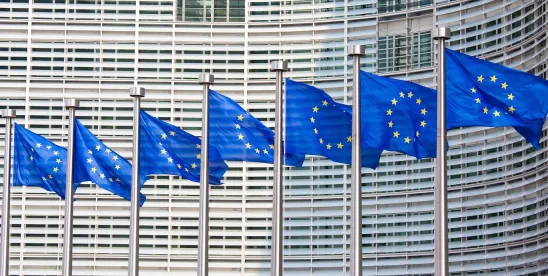| Go-To Guide: |
|
As the European Union increases its regulatory focus on foreign subsidies, businesses face a complex and evolving compliance landscape.
This GT Alert specifically addresses the EU’s investigative actions under two key frameworks: the Basic Anti-Subsidy Regulation (Regulation (EU) 2016/1037) and the Foreign Subsidies Regulation (FSR)(Regulation (EU) 2022/2560) and highlights notable cases, such as the investigation into Chinese-built battery electric vehicles (BEVs) under the Basic Anti-Subsidy Regulation, which led to definitive countervailing duties, as well as inquiries into Chinese wind turbine suppliers and security technology company Nuctech under the FSR.
The alert does not explore broader regulatory measures but instead focuses on the investigative processes and general strategies businesses can consider to prepare for potential EU investigations. Whether operating in the EU or entering the market, businesses should understand the differences and common themes in these cases should an investigation occur.
Overview of the Basic Anti-Subsidy Regulation and FSR
The Basic Anti-Subsidy Regulation and the FSR are two key legislative tools in the EU’s trade defense and competition policy toolkit. Both regulations aim to address competitive distortions that foreign subsidies from non-European countries cause to the EU internal market. The EU employs these instruments to maintain a level playing field for EU businesses and to ensure fair competition.
The Basic Anti-Subsidy Regulation, in effect since 2018, empowers the European Commission (EC) to investigate such subsidies and impose countervailing duties (CVDs) on imports benefiting from them, along with other remedies. This regulation is designed to safeguard EU industries from unfair competition by neutralizing the advantage non-EU countries gain from foreign subsidies, often by raising the price of subsidized imports. While the regulation focuses on direct subsidies to specific industries or companies, it also covers other forms of financial contributions that confer a benefit, such as grants, loans, tax incentives, or the provision of goods and services below market value. It primarily relies on trade measures like CVDs to level the playing field and mitigate the unfair advantage such subsidies provide, while also allowing for other appropriate actions where necessary.
The FSR, effective since 2023, expands the EU’s ability to address the distortive effects of foreign subsidies beyond the realm of traditional trade measures. It grants the EC powers to investigate foreign subsidies that may undermine competition in a wide range of scenarios, including mergers and acquisitions, public procurement processes, and other commercial activities within the EU market. M&A transactions and public procurement proceedings require ex-ante notifications only when specific thresholds are met. However, the EC can investigate every foreign subsidy during ex-officio proceedings regardless of any thresholds. This regulation is particularly relevant to the digital technology, green energy, telecommunications, transportation, and national security sectors, where fairness and competitiveness are critical to EU strategic interests. Unlike trade-focused instruments, the FSR offers flexibility by enabling the EC to deploy a variety of remedies tailored to specific situations. These measures include, among others, blocking mergers, imposing conditions on acquisitions, excluding subsidized companies from participating in public procurement tenders, and requiring companies to repay the subsidies in cases where they distort competition.
In essence, the FSR builds on the Basic Anti-Subsidy Regulation’s foundation by broadening its scope to address emerging challenges in the global economy. It incorporates additional tools to manage foreign subsidies across various sectors, reflecting the EU’s evolving approach to market fairness.
Comparing Investigations under the Basic Anti-Subsidy Regulation and FSR
Investigations under the Basic Anti-Subsidy Regulation and the FSR aim to protect the EU market from foreign subsidies that distort competition. Each investigation underscores the EU’s commitment to maintaining a level playing field.
Examples of Investigations
- Chinese-Built Battery Electric Vehicles (BEVs): The investigation into Chinese-made BEVs falls under the Basic Anti-Subsidy Regulation due to concerns over foreign subsidies that may give Chinese manufacturers an unfair competitive advantage in the EU’s automotive market. This case primarily focuses on how subsidies may distort trade by lowering the price of imported vehicles, potentially harming EU producers and jobs. The investigation is data-driven, focuses on market assessments, trade-flow analysis, and competitive impact.
- Wind Turbine Manufacturers: The investigation into Chinese wind turbine manufacturers falls under the FSR and explores how foreign subsidies affect competition in the renewable energy sector. Unlike the BEV case, which centers on trade dynamics, this investigation adopts a broader, sector-wide approach, analyzing the impact of subsidies on the wind turbine market, including market trends and industry practices, rather than focusing solely on trade flows.
- Nuctech: The investigation into Nuctech, a Chinese company in the security technology sector, is an example of a case under the FSR driven by national security concerns. The EC inquiry involved a dawn raid at the company’s Dutch and Polish offices, aimed at gathering evidence of potential subsidies that could distort competition in the EU’s security sector. The FSR is appropriate for this investigation given its focus on addressing market distortions in sensitive sectors such as national security and critical infrastructure.
While the investigations are all part of the EU’s broader efforts to address foreign subsidies, they differ in applicable regulations, underlying concerns, and methodologies:
- Applicable Regulations: The BEV inquiry falls under the Basic Anti-Subsidy Regulation, which focuses on foreign subsidies in the context of goods imports. Conversely, the wind turbine and Nuctech cases fall under the FSR, allowing the EU to assess whether foreign subsidies distort competition across various economic activities, from sector-specific impacts to security-related concerns.
- Nature of the Concerns: The BEV and wind turbine cases are primarily driven by concerns over economic fairness, aiming to ensure that subsidies in these sectors do not distort EU market competition. In contrast, the Nuctech investigation is driven by national security issues, given the sensitive nature of the security technology sector.
- Investigative Methods: Although both frameworks permit varied investigation methods, the nature of the concerns often dictates the approach. For example, the BEV and wind turbine investigations involved extensive data collection and market analysis, typical for economic-focused inquiries. The Nuctech investigation, however, involved a dawn raid—a tactic often reserved for cases involving urgent security or compliance concerns.
Considerations for Companies
Despite the differences in applicable regulations, specific concerns, and investigative methods, there are common strategies that businesses can consider to prepare for and respond to EU investigations. Businesses should consider taking proactive steps to navigate potential inquiries:
- Establish a Compliance Team: Form a dedicated team from legal, finance, and operations. Appoint a compliance officer to lead the team, ensuring regular monitoring and reporting of relevant information. This cohesive unit can address issues and coordinate responses to EC inquiries.
- Risk Assessment: Collect and process historical data on financial contributions across the whole capital group over the past three years and gather evidence to demonstrate that received subsidies could not distort the EU internal market (e.g., that the financial contributions were made on market terms).
- Engage Regulatory Consultants: Hire professionals well-versed in EU regulatory compliance. These may include lawyers with knowledge of legal frameworks, economists with experience in market analysis, and other consultants suited to your industry’s needs. Select consultants with proven experience in navigating EU regulations who can provide tailored advice to specific industries. Their insights can clarify the regulatory landscape and equip organizations to meet their obligations effectively.
- Implement Targeted Training: To reduce the risk of non-compliance, organize training sessions on EU foreign-subsidy regulations for both staff and senior management. Utilize external professionals or in-house resources to conduct workshops that incorporate case studies from past investigations and offer practical insights. Ensure that key decision-makers in senior management are involved, as their awareness is essential for cultivating a culture of compliance.
- Develop a Crisis Management Plan: Establish a plan detailing steps to take in the event of an investigation. Include communication strategies, designate spokespersons, and set protocols for interactions with regulatory authorities. A well-laid plan can help a company respond effectively and even mitigate risks before they escalate into formal investigations.
Conclusion
While EU investigations pose challenges, a proactive approach may help mitigate risks and enhance overall compliance. Staying informed and prepared is crucial for companies participating in the EU market. By understanding the regulatory landscape and implementing strategic measures, organizations can better navigate potential inquiries and safeguard their interests in an increasingly complex environment.
* Special thanks to Qualified Chinese Legal Consultant Ran Chang for contributing to this GT Alert.



 />i
/>i

